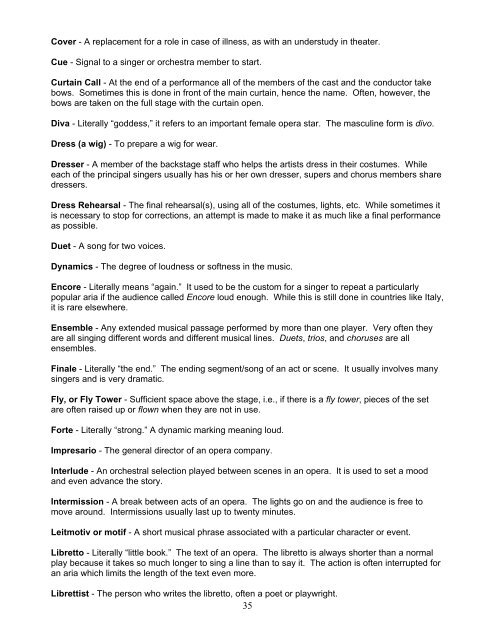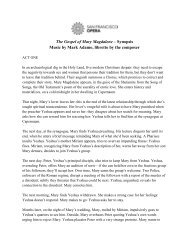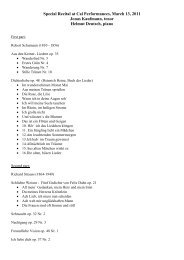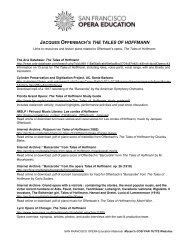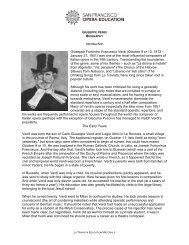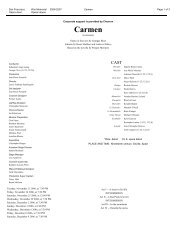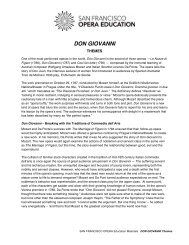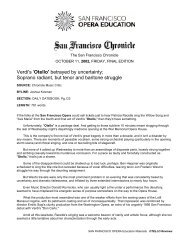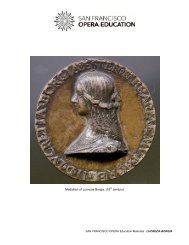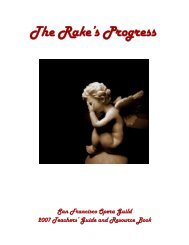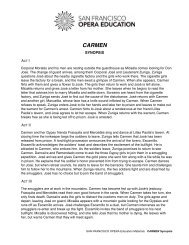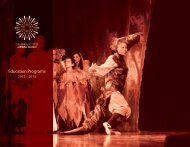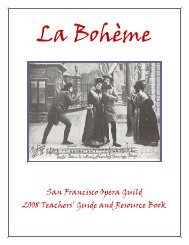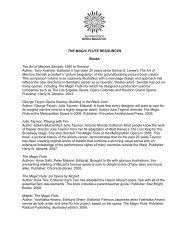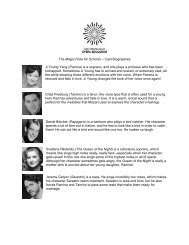Boris Godunov - San Francisco Opera
Boris Godunov - San Francisco Opera
Boris Godunov - San Francisco Opera
You also want an ePaper? Increase the reach of your titles
YUMPU automatically turns print PDFs into web optimized ePapers that Google loves.
Cover<br />
- A replacement for a role in case of illness, as with an understudy in theater.<br />
Cue<br />
- Signal to a singer or orchestra member to start.<br />
Curtain Call - At the end of a performance<br />
all of the members of the cast and the conductor take<br />
bows.<br />
Sometimes this is done in front of the main curtain, hence the name. Often, however, the<br />
bows are taken on the full stage with the curtain open.<br />
Diva - Literally “goddess,” it refers to an important female opera star. The masculine form is divo.<br />
Dress (a wig) - To prepare a wig for wear.<br />
Dresser<br />
- A member of the backstage staff who helps the artists dress in their costumes. While<br />
each of the principal singers usually has his or her own dresser, supers and chorus members share<br />
dressers.<br />
Dress Rehearsal - The final rehearsal(s), using all of the costumes, lights, etc. While sometimes<br />
it<br />
is necessary to stop for corrections, an attempt is made to make it as much like a final performance<br />
as possible.<br />
Duet - A song for two voices.<br />
Dynamics<br />
- The degree of loudness or softness in the music.<br />
Encore - Literally means “again.” It used to be the custom for a singer to repeat a particularly<br />
popular<br />
aria if the audience called Encore loud enough. While this is still done in countries like Italy,<br />
it is rare elsewhere.<br />
Ensemble - Any extended musical passage performed by more than one player. Very often they<br />
are all singing different words and different musical lines. Duets, trios, and choruses are all<br />
ensembles.<br />
Finale<br />
- Literally “the end.” The ending segment/song of an act or scene. It usually involves many<br />
singers and is very dramatic.<br />
Fly, or Fly Tower - Sufficient space<br />
above the stage, i.e., if there is a fly tower, pieces of the set<br />
are<br />
often raised up or flown when they are not in use.<br />
Forte<br />
- Literally “strong.” A dynamic marking meaning loud.<br />
Impresario - The general director of an opera company.<br />
Interlude<br />
- An orchestral selection played between scenes in an opera. It is used to set a mood<br />
and even advance the story.<br />
Intermission<br />
- A break between acts of an opera. The lights go on and the audience is free to<br />
move around. Intermissions usually last up to twenty minutes.<br />
Leitmotiv or motif - A short musical phrase associated with a particular character or event.<br />
Libretto - Literally “little book.” The text of an opera. The libretto is always shorter than a normal<br />
play because it takes so much longer to sing a line than to say it. The action is often interrupted for<br />
an<br />
aria which limits the length of the text even more.<br />
Librettist<br />
- The person who writes the libretto, often a poet or playwright.<br />
35


